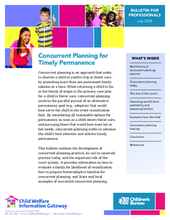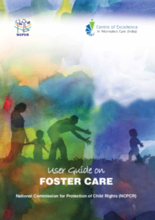Displaying 1381 - 1390 of 2221
This paper identifies key educational outcomes among young people in care in Ontario (Canada) of pre-school, elementary, secondary, and post-secondary age.
This bulletin for professionals explores concurrent planning, which is an approach that seeks to reduce the amount of time children spend in foster care by considering all reasonable permanency options the moment a child enters the system.
This comprehensive reference offers a robust framework for introducing and sustaining trauma-responsive services and culture in child welfare systems.
The aim of this study was to examine the outcomes of out-of-home placement in adolescence.
This article is based on research about children in long-term care. It focuses on the factors that help and hinder a child being and feeling stable in their foster home and having a sense of permanence.
This exploratory paper’s purpose is to determine the effect of demographic, risk, and protective factors on social-emotional development, as measured by the Ages and Stages Questionnaire Social Emotional (ASQ:SE), in children age 8 months to 5 years in out-of-home care in Ontario, Canada.
It is well documented that children placed in out-of-home care in Denmark perform poorly on a wide range of short-term and long-term outcomes compared to other children. This paper describes the core components of an innovative project that will attempt to address some of the major weaknesses of previous interventions and which, if successful, will be rolled out across foster care families nationwide.
This paper draws attention to a small sample of policy approaches and developments in meeting the needs of oung people leaving care settings in certain jurisdictions.
This book draws on archival, oral history and public policy sources to tell a history of foster care in Australia from the nineteenth century to the present day.
This User Guide aims to provide a comprehensive approach to the development of a good quality foster care service in India, which will be useful for a range of practitioners.


